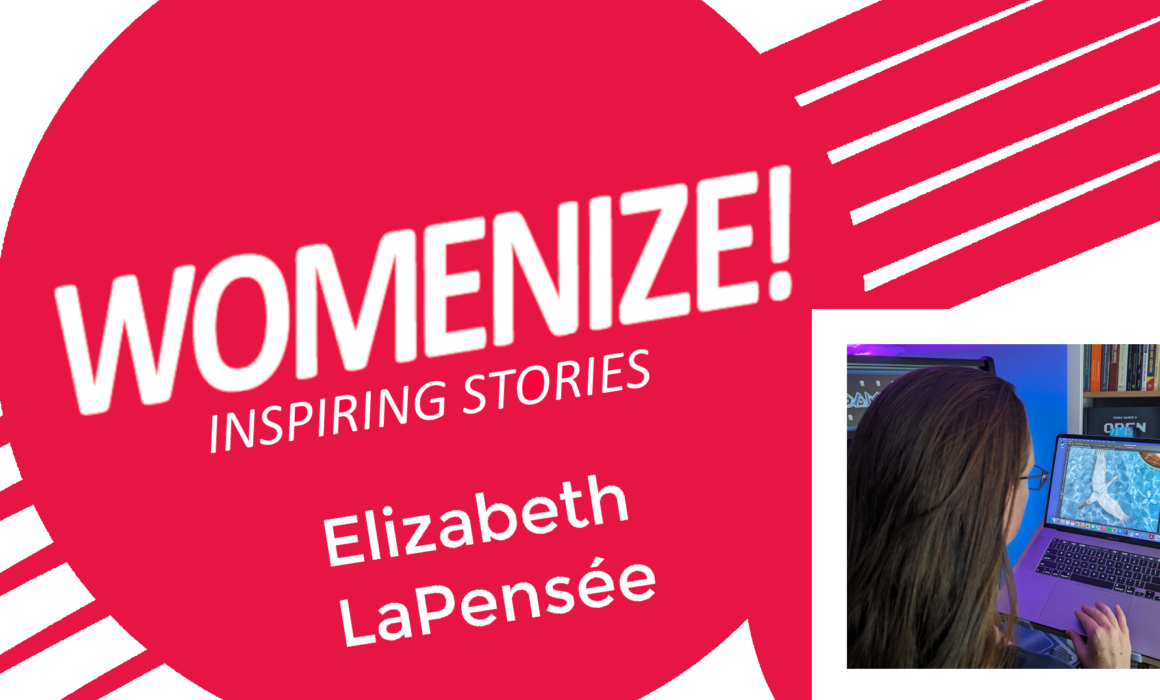Elizabeth LaPensée – Womenize! – Inspiring Stories
Womenize! – Inspiring Stories is our weekly series featuring inspirational individuals from games and tech. For this edition we talked to Elizabeth LaPensée, Narrative Director at Twin Suns Corp. She speaks about how her education in Liberal Studies and a Ph.D. in Interactive Arts & Technology shaped her diverse skill set, leading to her role as Narrative Director at Twin Suns Corp. where she values continuous prototyping and collaboration. Read more about Beth here:
Hi Beth! How did your educational background in Liberal Studies and a Ph.D. in Interactive Arts & Technology influence your career path in the gaming industry, and what pivotal moments during your studies helped shape your vision as a game designer and narrative director?
For me, getting an education was about having the time and ability to focus on wherever my attention drifted to. Ha ha. Liberal Studies gave me well-rounded experience in several different topics, ranging from graphic design to history to literature. I was very fortunate that the university I was attending had a Liberal Studies option, otherwise I would have had years finishing up all the various degrees I dipped into. Getting a Ph.D. through Simon Fraser University provided the resources for me to get into coding, game engines, and visual software.
I initially shaped my career around balancing several part-time industry contracts at once while weaving in academic work, because I was sure that I would never be able to stick with one singular company full-time and I wanted autonomy to develop games independently. There was something else in store for me, though! On the cusp of receiving tenure, I was invited to join Twin Suns Corp. full-time as their Narrative Director based on contract work I had done with them. I fulfilled my responsibilities, wrapped up my academic life, and jumped into what has turned out to be the greatest educational experience of all. I’ve learned from Twin Suns team members just how important on-screen work is and how vital it is to keep prototyping and iterating, day by day, moment to moment. It has been a refreshing and exciting journey working with them and I look forward to being able to some day share details about these lessons when we can announce what we’ve been up to.
Reflecting on your extensive career, what personal philosophies or practices have helped you maintain creativity and innovation, especially when transitioning between different types of creative work like games, comics, and teaching?
Letting go of the fear of criticism has been a life-long process and one that I still face and work through as best I can. When it comes down to it, you need to just create for creating’s sake, not for what others might think of you or say. The reality is that I just haven’t had access to budgets on the scale of AAA games for the games I’ve been a Creative Director for or even commercial scale budgets for comic collections I’ve edited. I’ve had opportunities but I hand those over, because I believe in building meaningful capacity and I know that I have alternative (albeit smaller budget) means to get work out into the world.
My aim is to show people that it’s possible to create and distribute your work whatever your circumstances. If someone thinks “I could do that,” that’s a huge win for me. And I hope they do!
You have been recognized for your leadership within the Serious Games community. What do you believe are the most critical qualities of effective leadership, and how have you applied these in your own career?
Thank you for remembering that! I was pretty blown away when I received that award since there were many very deserving people being considered that year. I remember it really well because we were all very supportive of one another and had hoped one another would be given that recognition. It was one of the warmest events I’ve ever been at.
The way I see leadership is that encouraging self-determination is essential. Everyone is creative, inspiring, and filled with possibilities. A genuine leader should support their team in feeling a sense of connection, self-expression, and autonomy while being part of a whole. It’s not about being the voice of a project, but about listening and supporting all of the voices together to achieve harmony.
Womenize! – Inspiring Stories Feature by Madeleine Egger

